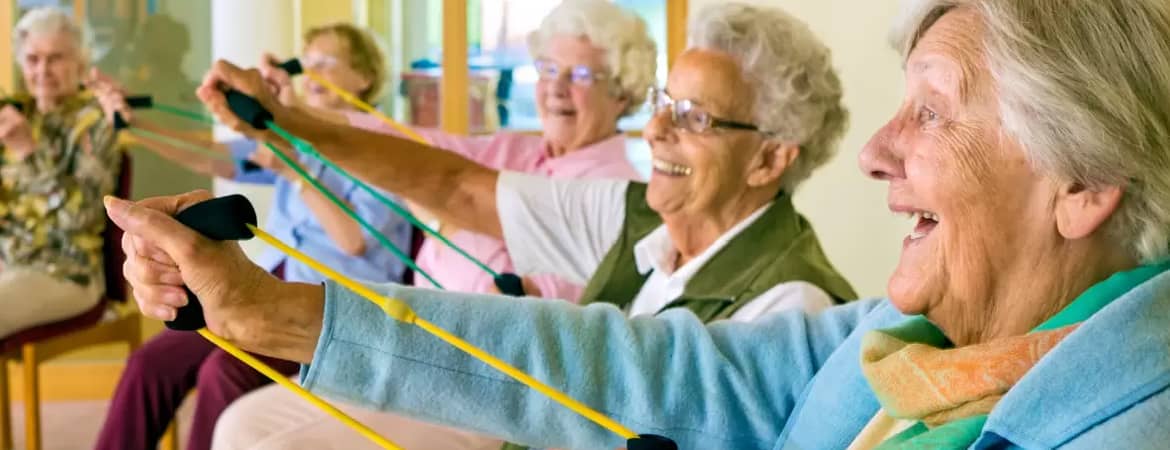If you are concerned about your elderly loved one’s brain health, you are not alone. Many people are worried about declining cognitive function later in life. However, while there is no surefire way to prevent memory loss, researchers are finding out more about how the brain works – and how to keep it healthy. According to experts, regular exercise is one of the best ways to boost brain health and prevent memory loss.
Keeping your brain sharp is as important as maintaining your physique – and with exercise, you can do both. Find out how exercise can boost brain health and the types of exercise that can best improve overall cognitive health.
Brain Exercises to Boost Memory Functions
Regular exercise has numerous benefits for a person’s physical and mental well-being. It can lower the risk of heart disease, aid in weight management, and reduce feelings of anxiety and depression. Other benefits of physical exercise include improving cognitive function and decreasing dementia risk.
According to Harvard Health, exercise can boost your thinking skills and memory – both directly and indirectly. Many studies suggest that parts of the brain that control memory and thinking are larger in volume among people who exercise than those who don’t.
Direct benefits of exercise
Dr. Scott McGinnis, a neurology instructor at Harvard Medical School, revealed that doing moderate exercise over six months to one year can help increase the volume of some brain regions.
Another study published in the journal Proceedings of the National Academy of Sciences proved that physical exercise is particularly beneficial for the brain. In this study involving 36 healthy young adults, researchers found that 10 minutes of pedaling on a stationary bike was linked with increased activity in the hippocampus, known for its involvement in remembering events and facts, including creating new memories.
One study also suggests that exercise, coupled with a healthy diet and low to moderate alcohol consumption, can protect your brain from shrinkage as you age. Furthermore, leading a healthy lifestyle that includes regular exercise can lower the risk of vascular disease, leading to possible cognitive problems.
Indirect benefits of exercise
Exercise has countless psychological benefits, including improved mood and sleep. It can also change one body's shape, making the person feel good and confident about their body, image, and themselves. Regular exercise also makes one strong and confident about their physical abilities.
Exercise can significantly boost memory and thinking skills by reducing anxiety and stress. Problems in these areas frequently contribute to or cause cognitive impairment.
Physical exercises that promote brain health
Now that you know the many benefits of regular exercise, it is worth encouraging your senior parent to include exercise in their daily routine. Whether they are already engaging in their favorite physical activity or just starting with it, the important thing is choosing an exercise that is safe and fun to do.
Here are some options that you can try to improve overall cognitive health.
- 1. Aerobic exercises
In addition to improving heart health, aerobic exercises like cycling, swimming, running, or walking can also help promote new brain cell growth and preserve existing brain cells. Regular aerobic exercise also enhances blood flow to the brain and boosts the size of the hippocampus – the part that’s involved in verbal memory and learning.
2. Strength trainingWho says strength training is exclusive for athletes and bodybuilders? Seniors can do it, too. Using resistance bands or weight lifting equipment, seniors can strengthen their bones and build lean muscle. Other strength training exercises, such as push-ups, crunches, leg squats, and pull-ups, can be done at home without any equipment. These exercises can improve mood, enhance concentration, and boost brainpower.
3. DancingDoes your senior parent love to dance? Here is some good news: Dancing is a fun exercise to boost brain health. One study that followed seniors for over 20 years found that regular dancing reduced the risk of dementia by 76% — twice as much as reading. A more recent review also concluded that dancing could enhance cognitive, emotional, physical, and social functions in people living with dementia.
Brain exercises that promote cognitive health
Aside from physical exercises, there are also plenty of brain exercises that you can do to promote cognitive health.
- 1. Complete a jigsaw puzzle.
Whether your senior relative is putting together a 100-piece or a 1,000-piece jigsaw puzzle, completing it can strengthen the brain. When they put together a jigsaw puzzle, they have to look at different pieces and figure out a way to connect them – this can be a great way to challenge and exercise the brain.
2. Learn something new.Whether your senior relative is putting together a 100-piece or a 1,000-piece jigsaw puzzle, completing it can strengthen the brain. When they put together a jigsaw puzzle, they have to look at different pieces and figure out a way to connect them – this can be a great way to challenge and exercise the brain.
3. Meditate.Meditating can help reduce anxiety and stress, slow breathing, and calm the body. But did you know that it may also help improve memory and increase the brain’s ability to process information? So, try to suggest meditation to your loved one. It is simple – they need to find a quiet spot, close their eyes, and focus their attention on their breathing.
Tips for choosing the correct exercises to prevent memory loss
How do you know which exercise is the best for your senior parent? Here are some tips to consider:
- Choose an activity that they enjoy.
If you choose an activity that your senior relative likes doing, they are more likely to do it every day.
- Set aside ‘exercise time’ each day.
Setting aside a specific ‘exercise time’ each day can help turn regular exercise into a habit.
- Exercise with a company.
Exercising is not something that a lot of people look forward to. Why not join your senior parent in doing their exercise routine to make it less boring? For instance, you both can go for a morning jog every day.
- Consider a personal trainer.
Hiring a personal trainer may be a good idea for seniors who have not exercised in quite some time. A qualified personal trainer can help design a suitable exercise routine, offer motivation, and monitor your loved one’s progress.
Helpful Tip: Remember to start slow and build up gradually. If you do morning walks with your senior parent, a 15-minute walk on the first day may be appropriate and safe. You can increase the time as they build endurance in walking. Also, remember to consult your doctor, especially if it’s been a while since they did any physical activity.
The Bottom Line
You should consider how your loved one perceives exercise as it can affect how they do their routine. For seniors not used to living a physically active lifestyle, exercise may feel like a chore instead of a fun activity. So make sure that you only suggest an exercise routine that your loved one likes to do – even better if it’s tied to their hobbies. Some options may include dancing, gardening, cycling, or swimming.
While more research is needed to determine how (and how much) exercise may improve brain health or slow the progress of cognitive decline, you can’t deny its numerous health benefits. Nevertheless, regular exercise is vital to stay physically and mentally healthy.
Syed has years of experience dealing with people, understanding their needs, and helping them find solutions to their problems.
As a Certified Senior Advisor (CSA), Certified Dementia Practitioner (CDP), Certified Montessori Dementia Care Professional (CMDCP), Syed is committed to working closely with Senior and their family knowing what is it like for individuals facing a challenging time, at times groping in dark trying to figure what is the appropriate next step or care level for their unique situation.
Syed and Senex Memory Advisors are fully committed to working closely with families in creating a personalized, step-by-step process memory care plan at zero cost.





Leave a comment